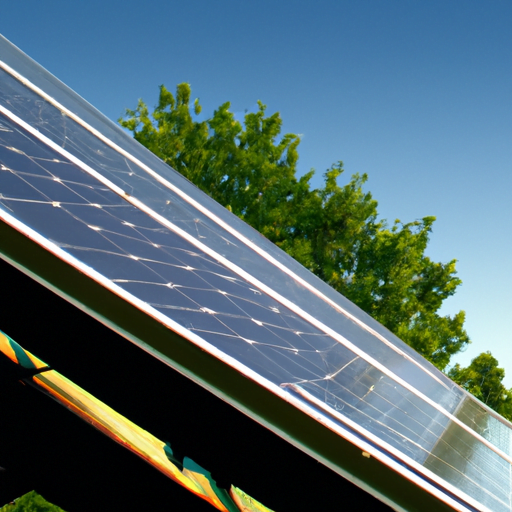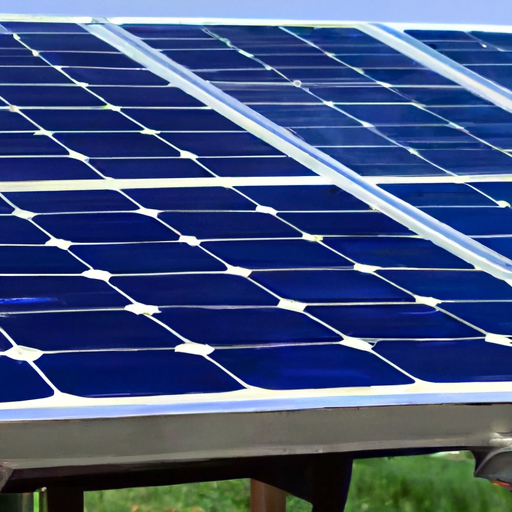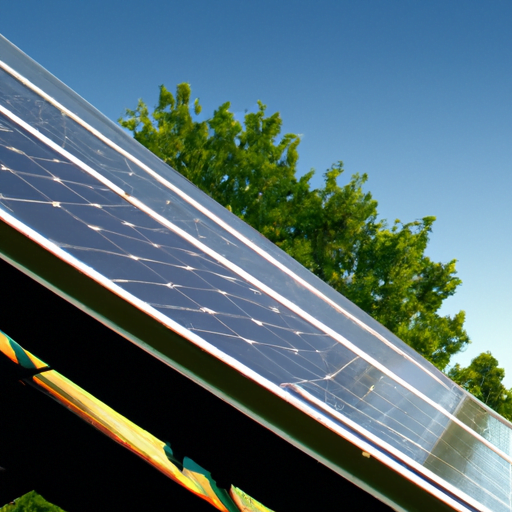So, have you ever wondered about the benefits of on-grid and off-grid solar systems? I mean, let’s face it, solar energy is becoming more popular and it’s definitely a sustainable option for powering your home. But which option is better – staying on the grid or going off the grid? Let’s dive right in and explore the ins and outs of both systems.
Living off the grid, now that’s an appealing concept, isn’t it? The idea of complete independence from the utility companies and being able to generate your own electricity from the sun sounds pretty great. With an off-grid solar system, you’re not reliant on the grid for your power needs, which means no more monthly bills or worrying about power outages. Plus, you have the freedom to live in more remote locations without worrying about access to electricity.
But hold on, don’t write off on-grid solar systems just yet. The benefit of staying connected to the grid is that you can actually sell any excess energy you generate back to the utility company, earning credits or even money. So, basically, your solar panels can become money-makers. Additionally, you have the security of a reliable power source in case your solar system is not producing enough energy, say during cloudy days or at night.
In our upcoming article, we’ll delve deeper into the advantages of both on-grid and off-grid solar systems, including the financial aspects, reliability, and environmental impact. So, whether you’re considering making the switch or just curious about the possibilities of solar energy, stay tuned to learn more!

Exploring the Benefits of On-Grid and Off-Grid Solar Systems
Living off the grid has become an increasingly popular lifestyle choice, especially as people embrace sustainable energy solutions. Solar power is a key component of this movement, offering individuals the ability to generate their own electricity and reduce their dependence on traditional power sources. However, when considering solar power, it is important to understand the differences between on-grid and off-grid systems and the benefits they offer.
Definition of On-Grid and Off-Grid Solar Systems
On-grid solar systems, as the name suggests, are connected to the main electric grid. These systems generate electricity from the sun through solar panels, which is then fed into the grid. Off-grid solar systems, on the other hand, operate independently of the grid, storing excess energy in batteries for use during times when the sun is not shining.
How On-Grid Solar Systems Work
On-grid solar systems work by harnessing the power of the sun through photovoltaic (PV) panels. These panels convert sunlight into direct current (DC) electricity, which is then converted into alternating current (AC) electricity through inverters. The AC electricity can then be used to power appliances and devices in a home or business. Any excess electricity generated by the solar panels is sent back to the grid, often earning credits or compensation from utility companies.
How Off-Grid Solar Systems Work
Off-grid solar systems are designed to be self-sufficient and operate without a connection to the electric grid. These systems utilize solar panels to generate electricity, which is stored in batteries for use during periods of low sunlight or at night. Off-grid systems often include a charge controller to regulate the flow of electricity between the solar panels and the batteries, ensuring efficient energy storage. In some cases, backup generators may also be incorporated into the system to provide additional power when needed.
Advantages of On-Grid Solar Systems
While both on-grid and off-grid solar systems have their advantages, on-grid systems offer several benefits that make them a popular choice for many individuals and businesses.
Lower Cost of Installation
One significant advantage of on-grid solar systems is that they tend to have a lower upfront cost compared to off-grid systems. Since on-grid systems do not require expensive battery storage, the overall installation cost is reduced. Additionally, the availability of the grid eliminates the need for backup generators, further reducing the initial investment required.
Potential for Energy Cost Savings
On-grid solar systems provide the opportunity for significant energy cost savings over time. By generating their own electricity, individuals can offset their reliance on traditional power sources, reducing their monthly utility bills. In some cases, if the system generates more electricity than is consumed, individuals may even earn credits or compensation from the utility company for the excess energy they contribute back to the grid.
Opportunity for Net Metering
Net metering is a billing arrangement offered by many utility companies that allows on-grid solar system owners to receive credit for the excess electricity they generate. When the solar system produces more electricity than is consumed, the excess is sent back to the grid, and the owner receives credit that can be applied to future electricity bills. This arrangement further enhances the financial benefits of on-grid solar systems.
Advantages of Off-Grid Solar Systems
While on-grid solar systems offer compelling benefits, off-grid systems also have their advantages, particularly for individuals seeking energy independence and the ability to live in remote locations.
Energy Independence
One of the most significant advantages of off-grid solar systems is the ability to achieve energy independence. With an off-grid system, individuals are not reliant on the electric grid and are free from the constantly fluctuating prices of electricity. This independence provides individuals with peace of mind, knowing they have control over their energy production and consumption.
No Utility Bills
Off-grid solar systems eliminate the need to pay monthly utility bills since individuals generate their own electricity. This can provide significant financial savings over time, especially in areas where utility rates are high. For individuals looking to reduce their expenses and free up their budget for other purposes, such as investing in sustainable technologies or improving the energy efficiency of their homes, off-grid solar systems can be an excellent choice.
Sustainable Solution for Remote Locations
Off-grid solar systems are particularly well-suited for remote locations that are far away from the electric grid. In these areas, connecting to the grid can be prohibitively expensive or simply not feasible. By harnessing the power of the sun, individuals can enjoy a sustainable energy solution that meets their electricity needs without relying on traditional power sources.
Factors to Consider when Choosing Between On-Grid and Off-Grid Solar Systems
When deciding between on-grid and off-grid solar systems, there are several factors to consider. Understanding these factors can help individuals make an informed decision that aligns with their energy needs and goals.
Location and Accessibility
The location of the property plays a crucial role in determining whether an on-grid or off-grid solar system is the better option. If the property is located in an area with easy access to the electric grid, an on-grid system may be more suitable. However, for properties in remote or off-grid locations, an off-grid system may be necessary.
Electricity Needs and Consumption
Assessing the electricity needs and consumption patterns is essential when choosing between solar systems. On-grid systems are generally more suitable for properties with higher energy demands since they can rely on the grid to supplement their electricity needs during periods of high consumption. Off-grid systems, on the other hand, require careful consideration of energy usage to ensure the system can meet the demand without relying on backup generators.
Budget and Financial Considerations
Budget is a crucial factor in deciding between on-grid and off-grid solar systems. On-grid systems tend to have a lower upfront cost, making them a more affordable option for individuals with a limited budget. Off-grid systems, on the other hand, require additional investments in batteries and backup generators, driving up the initial cost. However, it is important to consider the long-term financial benefits of each system, such as potential energy savings and the availability of government incentives.

Environmental Impact of On-Grid and Off-Grid Solar Systems
Both on-grid and off-grid solar systems have a positive environmental impact, contributing to a cleaner and more sustainable future.
Reduced Carbon Emissions
By generating electricity from the sun, both on-grid and off-grid solar systems significantly reduce the reliance on fossil fuels for electricity production. Fossil fuel-based power plants are major contributors to carbon emissions and air pollution. Switching to solar power helps to combat climate change by reducing greenhouse gas emissions and mitigating the negative impacts of traditional energy sources.
Conservation of Natural Resources
Solar power reduces the need for extracting finite natural resources, such as coal, oil, and natural gas, for electricity production. The mining and extraction of these resources contribute to habitat destruction, water pollution, and other environmental issues. By harnessing the abundant energy of the sun, on-grid and off-grid solar systems promote the conservation of natural resources and minimize the ecological footprint associated with energy generation.
Less Dependence on Fossil Fuels
Both on-grid and off-grid solar systems contribute to energy independence and reduce dependence on fossil fuels. By providing a renewable energy source that doesn’t require constant fuel supply, solar power helps to stabilize energy prices and reduce vulnerability to volatile energy markets. This increased energy security is particularly relevant given the finite nature of fossil fuel reserves and the global challenges associated with their extraction and transportation.
Case Studies: On-Grid Solar Systems
Numerous case studies have highlighted the benefits of on-grid solar systems in various settings, from urban to rural areas.
Successful Implementations in Urban Settings
In urban areas, on-grid solar systems have been successfully integrated into buildings and infrastructure. Rooftop solar installations, for example, have become increasingly popular, with many homeowners and businesses taking advantage of the sun-exposed spaces on their roofs. These systems not only provide clean energy but also reduce strain on the electric grid during peak demand periods.
Impact on Energy Consumption Patterns
On-grid solar systems have had a significant impact on energy consumption patterns. By generating clean energy onsite, individuals and businesses become more conscious of their energy usage and strive to be more efficient. This increased awareness often leads to a reduction in overall energy consumption, further maximizing the environmental and financial benefits of on-grid solar systems.
Integration with Smart Grid Technology
The integration of on-grid solar systems with smart grid technology has allowed for advanced monitoring and control of electricity generation and consumption. Smart meters and energy management systems enable users to track their energy production and consumption in real-time, optimizing their solar system’s performance. This integration also allows for dynamic pricing and load management, enhancing the overall efficiency and reliability of the electric grid.
Case Studies: Off-Grid Solar Systems
Off-grid solar systems have played a transformative role in underserved areas and have the potential to improve the quality of life for many.
Implications for Rural Electrification
In many rural and remote parts of the world, access to reliable electricity is limited or nonexistent. Off-grid solar systems offer an affordable and sustainable solution to address this issue. Distributed solar power enables communities to have access to electricity for essential services such as lighting, education, healthcare, and communication. These systems have the potential to spur economic development and improve the overall well-being of rural communities.
Improving Quality of Life in Underserved Areas
Off-grid solar systems have been instrumental in improving the quality of life in underserved areas. The provision of electricity enables access to modern conveniences such as refrigeration, clean water, and telecommunications, transforming the lives of individuals and communities. Furthermore, the use of clean energy sources helps reduce the health risks associated with traditional energy sources, such as indoor air pollution from kerosene lamps.
Role in Disaster Resilience
Off-grid solar systems play a critical role in disaster resilience, providing a reliable source of electricity during power outages. Natural disasters such as hurricanes, earthquakes, and floods often disrupt the electric grid, leaving communities without power for extended periods. Off-grid solar systems with battery storage can provide immediate and continuous electricity supply, powering essential devices and enabling communication and emergency response efforts.
Potential Challenges of On-Grid and Off-Grid Solar Systems
While on-grid and off-grid solar systems offer numerous benefits, they are not without their challenges. Understanding these challenges can help individuals make informed decisions and address any potential issues.
Reliance on Grid Infrastructure
On-grid solar systems are dependent on the electric grid for backup power and electricity supply during periods of low solar input. In situations where the grid is unreliable or the infrastructure is inadequate, relying solely on an on-grid system may pose challenges. Backup generators or battery storage systems can be considered to mitigate these issues.
Intermittency of Solar Power
Solar power is inherently intermittent, as it relies on the availability of sunlight. This can be a challenge for both on-grid and off-grid solar systems during periods of low solar input, such as cloudy days or during the night. In off-grid systems, proper battery storage capacity is essential to ensure a continuous supply of electricity. On the other hand, on-grid systems can rely on the grid for supply during these periods.
System Maintenance and Upkeep
Both on-grid and off-grid solar systems require regular maintenance to ensure optimal performance and longevity. This includes cleaning the solar panels, inspecting the electrical components, and monitoring battery health (for off-grid systems). Regular maintenance helps identify and resolve issues promptly, ensuring that the system operates efficiently and maximizes the benefits of solar power.
Future Trends in On-Grid and Off-Grid Solar Systems
The future of solar power looks promising, with advancements and developments that will further enhance the benefits of both on-grid and off-grid systems.
Advancements in Battery Storage Technology
Battery storage technology continues to advance, with more efficient and cost-effective solutions entering the market. These advancements will further enhance the viability of both on-grid and off-grid solar systems, as improved storage capacity and performance will enable greater energy independence and reliability.
Integration of Renewable Energy Sources
The integration of multiple renewable energy sources, such as wind and solar power, will increase the efficiency and reliability of on-grid and off-grid systems alike. By diversifying the energy sources, systems can better mitigate the intermittency of solar power and provide a more stable and consistent electricity supply.
Policy Support and Incentives
Government policies and incentives are crucial in promoting the adoption of solar power systems. Continued support through favorable policies, such as net metering programs, tax credits, and grants, will encourage individuals and businesses to invest in solar energy. These incentives will further drive the growth of on-grid and off-grid solar systems, making them more accessible and affordable for everyone.
Conclusion
When considering solar power, it is important to explore the benefits and limitations of both on-grid and off-grid systems. Each offers unique advantages based on individual needs, location, and budget. On-grid systems provide cost-effective installation and potential energy cost savings, while off-grid systems offer energy independence and sustainability in remote areas. Considering factors such as location, electricity needs, and budget will help individuals make the right choice for their energy requirements.
Ultimately, the increasing adoption of both on-grid and off-grid solar systems contributes to a more sustainable future, reducing carbon emissions, conserving natural resources, and lessening reliance on fossil fuels. With continued advancements, policy support, and incentives, solar power will play an increasingly vital role in meeting our energy needs while minimizing our impact on the environment. Embracing solar power is a crucial step towards a cleaner, greener, and more sustainable planet.




